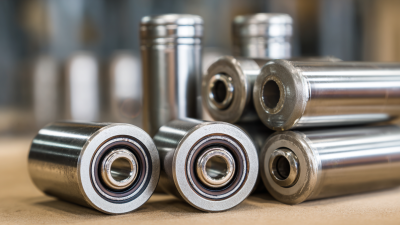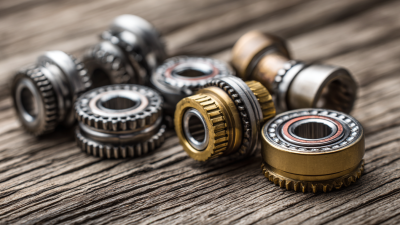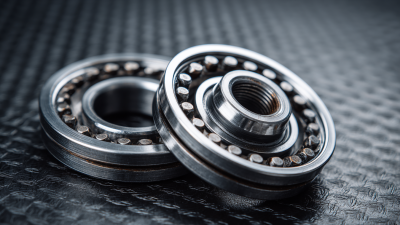Unlocking the Secrets to Choosing the Perfect Car Bearing for Your Vehicle
Table of Contents
- Understanding Different Types of Car Bearings for Optimal Performance
- Assessing Your Vehicle's Specifications Before Selecting Bearings
- Key Factors to Consider When Choosing the Right Car Bearing
- Comparing the Benefits of Ball Bearings vs. Roller Bearings
- Maintenance Tips to Extend the Life of Your Chosen Car Bearings
- Identifying Common Signs of Worn-out Bearings and When to Replace Them
- Choosing the Right Angular Contact Ball Bearing: A Focus on Hcsz 7010 for Power Tools and Household Appliances
- FAQS
- Conclusion
- Related Posts
Figuring out the right car bearing isn’t just a small detail—it’s actually pretty important for how well and safely your vehicle runs. Did you know that, according to Market Research Future, the global automotive bearings market is expected to hit around USD 22.4 billion by 2025? Wow, that’s a huge number, and it’s growing at roughly 5.85% each year from 2019 to 2025. All this just shows how crucial it is to pick high-quality, durable bearings if you want your car to perform at its best and last longer.

One company that really stands out is Shandong Hangshuo Bearing Co., Ltd. — they’ve been around since 2015 and are pretty well-known in the tech-driven bearing world. They focus on research, manufacturing, and selling a wide range of bearings, including those for cars. By understanding what makes a good bearing and keeping up with the latest tech, both car owners and manufacturers can make smarter choices, making sure vehicles run smoothly and stay reliable over time.
Understanding Different Types of Car Bearings for Optimal Performance
Picking the right car bearing really matters if you want your vehicle to run smoothly and last longer. There are actually a few different types of bearings out there, each made for specific parts of your car’s mechanics. For example, you’ve got ball bearings, roller bearings, and tapered roller bearings. Most cars use ball bearings because they’re pretty versatile—they can handle radial loads well and are pretty reliable. Roller bearings are great when you need to bear heavier loads, like in parts that take a lot of stress. Tapered roller bearings are especially suited for managing both radial and axial loads, like in the wheel hubs of your vehicle.
When you're choosing bearings, it's important to think about things like how much weight they need to support, how fast they need to spin, and the environment they’ll be working in. If you’re into high-performance cars, investing in precision-engineered bearings made from advanced materials can really boost your car’s responsiveness and longevity. Don’t forget to consider the specific needs of different parts of your vehicle—whether it’s the drivetrain, suspension, or wheels. Understanding the different types of bearings and what they’re best suited for can help you make smarter choices. Ultimately, knowing your options means your vehicle will perform better and stay reliable for longer.
Assessing Your Vehicle's Specifications Before Selecting Bearings
When you're picking out the right car bearings, really taking the time to understand your vehicle's specs is a big deal. Digging into your car’s manual can save you a lot of hassle—it's like having a cheat sheet! Things like how much your car weighs, the size of the engine, and whether it's front-wheel or rear-wheel drive all play a part. These details not only help you figure out which bearings will fit, but they also tell you how much stress or load they'll have to handle. Ignoring these little details could mean your bearings wear out faster or don’t perform as they should, which nobody wants.
And hey, don’t forget about how you actually drive day-to-day. If you're often dealing with tough conditions, like rough roads or pushing your car for high performance, your bearings need to be up for the challenge. Things like the type of lubrication, the material they’re made from, and how much space there is around them really matter too. Taking a bit of time to consider all these factors can make a huge difference—leading to a smoother ride and helping those parts last longer. It's all about doing your homework so your car keeps running happily for the miles ahead.
Key Factors to Consider When Choosing the Right Car Bearing
Picking the right car bearing really makes a difference when it comes to how long your vehicle lasts and how well it runs. When you're choosing a bearing, keep in mind some key things like how much weight it can handle, the quality of the material, and whether it can handle the environment it's going to be exposed to. Load capacity is super important — it tells you how much stuff the bearing can hold up without bouncing or breaking down. Plus, the material of the bearing really impacts how tough and long-lasting it is. Going for high-quality materials can seriously boost its lifespan, so you’re not stuck fixing things all the time.
Another thing to think about is your vehicle’s actual operating conditions. Things like temperature swings, exposure to water or moisture, dirt, and dust can all take a toll on bearing performance. For example, bearings in cars need to be tough enough to handle lots of motion and environmental changes without giving out. By the way, Shandong Hangshuo Bearing Co., Ltd., a pretty innovative company started back in 2015, specializes in making all kinds of bearings, including ones for cars. With the needle roller bearing market expected to grow a lot in the next few years, making sure you pick a high-quality, compatible bearing is key to keeping your ride running smoothly and safely.
Factors to Consider When Choosing the Right Car Bearing
Comparing the Benefits of Ball Bearings vs. Roller Bearings
When you're trying to pick the right bearing for your car, it's pretty important to understand the differences between ball bearings and roller bearings. They each have their own roles and perks. For example, ball bearings are usually better for high-speed stuff—they tend to run smoothly because of their design, which minimizes friction. On the other hand, roller bearings are more go-to if you need to handle heavy loads—they’re typically used in more rugged, heavy-duty situations. Actually, some studies show that double-row angular contact wheel bearings are fantastic because they handle heat and mechanical stress pretty well, making them a solid choice for cars where stability and even load distribution matter a lot.
A good tip? When you're choosing bearings, think about your car’s weight and what you’ll be using it for. If you’re often driving off-road or hauling heavy stuff, roller bearings might be the way to go. But if you’re into high-performance driving and want that extra speed and efficiency, ball bearings could give you the edge. Also, keep an eye on the market—bearing technology is booming, with projections saying it’ll hit around USD 78.45 billion by 2030. That just shows how much more important these little guys are getting, especially in automotive tech.
Plus, with new stuff like microdimple textured surfaces in rolling bearings, the industry is constantly finding ways to boost performance across all kinds of stuff—from cars to wind turbines. In the end, making an informed choice about your bearings can seriously pay off when it comes to your vehicle’s longevity and overall performance.
Maintenance Tips to Extend the Life of Your Chosen Car Bearings
 Taking care of your car bearings is super important if you want your vehicle to run smoothly and last a good long time. The first step? Regularly checking them out. This way, you can catch any early signs of trouble—like strange noises or vibrations—before they turn into bigger problems. It’s also a good idea to keep them clean; dirt and debris can speed up wear and tear, which nobody wants. Just grabbing a soft cloth to wipe around the outside and making sure the seals are in good shape can go a long way in keeping contaminants out.
Taking care of your car bearings is super important if you want your vehicle to run smoothly and last a good long time. The first step? Regularly checking them out. This way, you can catch any early signs of trouble—like strange noises or vibrations—before they turn into bigger problems. It’s also a good idea to keep them clean; dirt and debris can speed up wear and tear, which nobody wants. Just grabbing a soft cloth to wipe around the outside and making sure the seals are in good shape can go a long way in keeping contaminants out.
Lubrication is another key piece of the puzzle. Make sure you're using the right kind of grease, ideally what your car manual suggests. Re-greasing them now and then helps cut down on friction and overheating, which means everything stays running smoothly. Oh, and don’t forget to be mindful of the conditions you drive in—extreme heat, cold, or hauling heavy loads can all impact how your bearings perform. Paying attention to these little details can not only help your bearings last longer but also keep your ride feeling better overall.
Identifying Common Signs of Worn-out Bearings and When to Replace Them
When it comes to taking care of your vehicle, one thing that often gets overlooked but is super important is spotting worn-out bearings. You know those weird noises, like grinding or squeaking sounds coming from the wheels? Yeah, that’s usually a sign that something's off with the bearings. According to a study by the Automotive Research Association, nearly 70% of issues people report with suspension and handling actually trace back to bad bearings. Oh, and if you ever feel vibrations in the steering wheel or notice that your wheels seem to have more play than usual, those are big red flags. It’s definitely time to think about replacing the bearings — better safe than sorry, right?
Timing here is everything. The National Institute for Automotive Service Excellence recommends getting your bearings checked roughly every 30,000 miles. But honestly, if you start noticing signs like noises or vibrations earlier, it’s worth having them looked at sooner. Ignoring these issues can cause increased friction and heat, which might lead to even bigger problems — like damage to the hub or wheel assembly. So, catching these signs early not only keeps your ride smooth and reliable but also saves you from shelling out a ton of cash on repairs later. Best to stay ahead of it!

Choosing the Right Angular Contact Ball Bearing: A Focus on Hcsz 7010 for Power Tools and Household Appliances
When selecting the ideal angular contact ball bearing for applications in power tools and household appliances, the Hcsz 7010 model stands out due to its excellent design tailored for high performance. Angular contact ball bearings are distinctive in their ability to support both radial and axial loads simultaneously, making them essential in mechanisms that require reliability under varying operational stresses. The Hcsz 7010, with its precision engineering, is adept at operating at elevated speeds, thereby enhancing efficiency in power tools where rapid movement and minimal friction are critical.
The contact angle is a pivotal aspect when considering the load capacity of angular contact ball bearings. For the Hcsz 7010, the contact angle is optimized at 15 degrees, which significantly increases its axial load capacity. According to industry reports, higher contact angles correlate with improved axial load-bearing capabilities, ensuring that the bearing can endure greater forces without compromising performance. This characteristic is especially important for power tools that apply significant axial loads during operation, as the increased contact angle allows the bearing to adapt to these forces effectively.
In an environment where precision and durability are paramount, the Hcsz 7010 angular contact ball bearing not only meets but exceeds expectations. Its high-speed capability and resilience in the face of axial force exemplify the technical advancements in bearing design. As noted in various technical publications, selecting the right bearing with the suitable contact angle is crucial for optimal performance and longevity in both power tools and household appliances, reinforcing the value of the Hcsz 7010 in today's market.
FAQS
: Understanding your vehicle's specifications helps narrow down bearing options and ensures compatibility, which is crucial for optimal performance and longevity of components.
Key specifications include weight, engine size, type of drive (front or rear-wheel), and the nature of your driving conditions, as they affect the load and stress on the bearings.
If you often drive in severe conditions or engage in high-performance activities, it's essential to choose bearings that can handle greater strain.
Ball bearings are suited for high-speed applications with lower friction, while roller bearings can handle heavier loads and are ideal for robust applications.
Roller bearings are recommended if you frequently drive in rugged conditions or carry heavy loads, whereas ball bearings are better for high-performance vehicles.
Innovations like microdimple textured surfaces in rolling bearings enhance performance across various applications, influencing factors such as durability and efficiency.
The lubrication type is crucial as it impacts the performance, temperature management, and overall reliability of the bearings, depending on their application.
The bearings market is projected to grow significantly, indicating advancements and optimizations that could enhance vehicle performance and durability.
Ignoring specifications and selecting the wrong bearings can lead to poor performance, increased wear and tear, and premature failure of the components.
The material of the bearings influences durability, load capacity, and resistance to environmental factors, making it an essential consideration for selection.
Conclusion
Picking the right car bearing is pretty important if you want your vehicle to run smoothly and last longer. Honestly, it helps to get a grip on the different types out there, like ball bearings and roller bearings, and what benefits each one offers. Before you go making a choice, it’s a good idea to check your car’s specs so you know what’s compatible. A few things you really want to keep in mind are load capacity, how durable it is, and how much effort it takes to maintain. Doing routine maintenance can really make those bearings last longer. Also, keeping an eye out for the usual signs of wear can help you catch problems early and swap them out before things get serious — that way, you stay safe and keep everything running efficiently.
At Shandong Hangshuo Bearing Co., Ltd., we’ve been focused on automotive bearings since 2015. We offer a wide range of high-quality products to meet different industry needs. Our approach to research, development, and manufacturing isn’t just about making good bearings — we aim to help our customers find the perfect fit for their vehicles. Basically, we’re committed to providing reliable, top-notch bearings that keep you on the road without a hitch.
Related Posts
-

Maximizing Efficiency: The Unique Advantages of Cam Follower Needle Roller Bearings in Modern Manufacturing
-

Ultimate Guide to Selecting the Right Torrington Roller Bearing for Your Application
-

Exploring Market Trends for Small Needle Bearings at 2025 China Import and Export Fair
-

Exploring the Future of Car Bearings: Innovations and Market Trends Driving 2024 Growth
-

How to Choose the Right Swing Ring Bearing for Your Industrial Application
-

7 Tips to Optimize Your Miniature Flanged Ball Bearings for Maximum Performance
Blog Tags:

